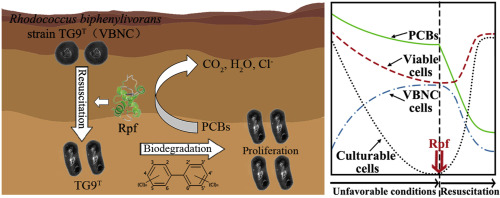当前位置:
X-MOL 学术
›
Environ. Pollut.
›
论文详情
Our official English website, www.x-mol.net, welcomes your feedback! (Note: you will need to create a separate account there.)
Supplementing resuscitation-promoting factor (Rpf) enhanced biodegradation of polychlorinated biphenyls (PCBs) by Rhodococcus biphenylivorans strain TG9T.
Environmental Pollution ( IF 8.9 ) Pub Date : 2020-03-27 , DOI: 10.1016/j.envpol.2020.114488 Zhe Ye 1 , Hongxuan Li 1 , Yangyang Jia 1 , Jiahui Fan 1 , Jixing Wan 1 , Li Guo 1 , Xiaomei Su 2 , Yu Zhang 3 , Wei-Min Wu 4 , Chaofeng Shen 1
Environmental Pollution ( IF 8.9 ) Pub Date : 2020-03-27 , DOI: 10.1016/j.envpol.2020.114488 Zhe Ye 1 , Hongxuan Li 1 , Yangyang Jia 1 , Jiahui Fan 1 , Jixing Wan 1 , Li Guo 1 , Xiaomei Su 2 , Yu Zhang 3 , Wei-Min Wu 4 , Chaofeng Shen 1
Affiliation

|
The biodegradation of polychlorinated biphenyls (PCBs) occurs slowly when the degrading bacteria enter a low activity state, such as a viable but nonculturable (VBNC) state, under unfavorable environmental conditions. The introduction of resuscitation-promoting factor (Rpf) can re-activate VBNC bacteria. This study tested the feasibility of enhancing PCB biodegradation via supplementing Rpf in liquid culture and soil microcosms inoculated with Rhodococcus biphenylivorans strain TG9T. Exogenous Rpf resuscitated TG9T cells that had previously entered the VBNC state after 90 d of nutrient starvation, resulting in the significantly enhanced degradation of PCB by 24.3% over 60 h in liquid medium that originally contained 50 mg L-1 Aroclor 1242. In soil microcosms containing 50 mg kg-1 Aroclor 1242 and inoculated with VBNC TG9T cells, after 49 d of supplementation with Rpf, degradation efficiency of PCB reached 34.2%, which was significantly higher than the control. Our results confirmed that exogenous Rpf resuscitated VBNC TG9T cells by stimulating endogenous expression of rpf gene orthologs. The enhanced PCB-degrading capability was likely due to the increased cell numbers and the strong expression of PCB catabolic genes. This study demonstrated the role of Rpf in enhancing PCB degradation via resuscitating PCB-degrading bacteria, indicating a promising approach for the remediation of PCB contamination.
中文翻译:

补充复苏促进因子(Rpf)增强了Rhodococcus biphenylivorans菌株TG9T对多氯联苯(PCBs)的生物降解。
当降解细菌在不利的环境条件下进入低活性状态(例如,可存活但不可培养的(VBNC)状态)时,多氯联苯(PCB)的生物降解会缓慢发生。复苏促进因子(Rpf)的引入可以重新激活VBNC细菌。这项研究测试了通过在液体培养物中和在接种Rhodococcus biphenylivorans菌株TG9T的土壤微观世界中补充Rpf来增强PCB生物降解的可行性。在90天的营养饥饿后,先前已进入VBNC状态的外源Rpf复苏的TG9T细胞,在最初含有50 mg L-1 Aroclor 1242的液体培养基中,在60小时内PCB降解显着提高了24.3%。在土壤微观世界中含有50 mg kg-1 Aroclor 1242,并接种了VBNC TG9T细胞,补充RPF 49 d后,PCB的降解效率达到34.2%,明显高于对照组。我们的结果证实,外源性Rpf通过刺激rpf基因直系同源基因的内源性表达使VBNC TG9T细胞复苏。增加的PCB降解能力可能是由于细胞数量增加和PCB分解代谢基因的强表达所致。这项研究证明了Rpf在通过复苏PCB降解细菌来增强PCB降解中的作用,表明了一种有前途的补救PCB污染的方法。增加的PCB降解能力可能是由于细胞数量增加和PCB分解代谢基因的强表达所致。这项研究证明了Rpf在通过复苏PCB降解细菌来增强PCB降解中的作用,表明了一种有前途的补救PCB污染的方法。增加的PCB降解能力可能是由于细胞数量增加和PCB分解代谢基因的强表达所致。这项研究证明了Rpf在通过复苏PCB降解细菌来增强PCB降解中的作用,表明了一种有前途的补救PCB污染的方法。
更新日期:2020-03-28
中文翻译:

补充复苏促进因子(Rpf)增强了Rhodococcus biphenylivorans菌株TG9T对多氯联苯(PCBs)的生物降解。
当降解细菌在不利的环境条件下进入低活性状态(例如,可存活但不可培养的(VBNC)状态)时,多氯联苯(PCB)的生物降解会缓慢发生。复苏促进因子(Rpf)的引入可以重新激活VBNC细菌。这项研究测试了通过在液体培养物中和在接种Rhodococcus biphenylivorans菌株TG9T的土壤微观世界中补充Rpf来增强PCB生物降解的可行性。在90天的营养饥饿后,先前已进入VBNC状态的外源Rpf复苏的TG9T细胞,在最初含有50 mg L-1 Aroclor 1242的液体培养基中,在60小时内PCB降解显着提高了24.3%。在土壤微观世界中含有50 mg kg-1 Aroclor 1242,并接种了VBNC TG9T细胞,补充RPF 49 d后,PCB的降解效率达到34.2%,明显高于对照组。我们的结果证实,外源性Rpf通过刺激rpf基因直系同源基因的内源性表达使VBNC TG9T细胞复苏。增加的PCB降解能力可能是由于细胞数量增加和PCB分解代谢基因的强表达所致。这项研究证明了Rpf在通过复苏PCB降解细菌来增强PCB降解中的作用,表明了一种有前途的补救PCB污染的方法。增加的PCB降解能力可能是由于细胞数量增加和PCB分解代谢基因的强表达所致。这项研究证明了Rpf在通过复苏PCB降解细菌来增强PCB降解中的作用,表明了一种有前途的补救PCB污染的方法。增加的PCB降解能力可能是由于细胞数量增加和PCB分解代谢基因的强表达所致。这项研究证明了Rpf在通过复苏PCB降解细菌来增强PCB降解中的作用,表明了一种有前途的补救PCB污染的方法。


























 京公网安备 11010802027423号
京公网安备 11010802027423号